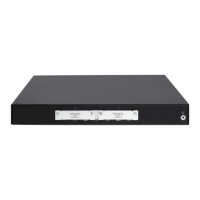108
Configuring EAD fast deployment
Overview
Endpoint Admission Defense (EAD) is an integrated endpoint access control solution of Hewlett
Packard Enterprise, which enables the security client, security policy server, access device, and
third-party server to work together to improve the threat defensive capability of a network. If a
terminal device seeks to access an EAD network, it must have an EAD client, which performs 802.1X
authentication.
EAD fast deployment enables the access device to redirect a user seeking to access the network to
download and install EAD client. This function eliminates the tedious job of the administrator to
deploy EAD clients.
EAD fast deployment is implemented by the following functions:
• Free IP
• URL redirection
Free IP
A free IP is a freely accessible network segment, which has a limited set of network resources such
as software and DHCP servers. An unauthenticated user can access only this segment to download
EAD client, obtain a dynamic IP address from a DHCP server, or perform some other tasks to be
compliant with the network security strategy.
URL redirection
If an unauthenticated 802.1X user is using a web browser to access the network, the EAD fast
deployment function redirects the user to a specific URL, for example, the EAD client software
download page.
The server that provides the URL must be on the free IP accessible to unauthenticated users.
Hardware compatibility with EAD fast deployment
The following matrix shows the feature and hardware compatibility:
Hardware Feature compatibility
MSR900 No
MSR93X No
MSR20-1X No
MSR20 No
MSR30 Supported only on MSR30-11E and MSR30-11F
MSR50 No
MSR1000 No

